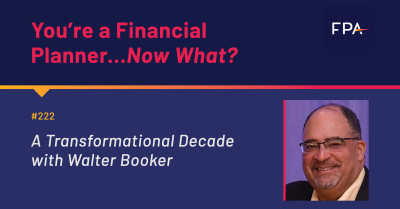
A transformational time for advisors
Hannah and Walter kicked off their discussion by talking about this exciting, transformational time for advisors. In the decade to come, the client base will shift from baby boomers holding the most assets to Gen Xers and millennials. Technology will continue to play a huge role; as Walter put it, you’re going to have to be a “fully hybrid advisor” by the end of the decade, or you might just go extinct.
These changes in the client base will require planners to be prepared to serve diverse clients. You can start preparing right now.
“One of the things that I would encourage people to do is put themselves right proactively in situations where you're the only, or one of the few. And one of the things that you'll appreciate is the difference in that experience,” said Walter. “I think that...will hopefully make you more empathetic with people and realize the importance of being able to establish connections with folks.”
Having that empathy and understanding is essential for every planner. You have to know the differences between cultures in order to serve clients from those cultures. It doesn’t have to be hard; one of the easiest ways to start experiencing diversity is to “eat your way through it,” as Walter put it.
“Once a month, go out to a Latinx establishment. Or in this age of COVID, order and pick it up,” said Walter. “Engage with the people at the restaurant, don’t just eat the food...you’ll realize that there are things to be learned about all of these different communities.”
Bridging the financial literacy gap
Financial planners are able to help close the financial literacy gap in this country. As a planner, most people take your advice because they trust you, not because you’re giving them exclusive information. They can “learn a fair amount” from reading, Walter pointed out. But instead, people turn to a professional who can help them personally.
That’s powerful. And if financial planners harnessed that power, they can start improving financial literacy in our society. Start financial education young and increase its frequency in schools, and kids are more likely to be financially literate.
One of the greatest things advisors can do? Help the community at large and increase its overall level of skill, said Walter. You typically don’t have access to decent financial education unless you have access to or the means to work with an advisor. We can change that.
“I think that if advisors are willing to commit five to 10% of their time of giving away the basic knowledge, they will help create a much better society,” said Walter. “And even if you're not that charitably inclined or altruistic...you're going to end up paying for these people anyway. Wouldn't you rather try to be part of the solution and help them understand how to develop financial skill?”
What you need to succeed as a planner
Hannah pointed out that on this podcast, they get to speak to planners who have had wildly different careers. She and Walter discussed three career pathways in the advisory space: being a client-facing advisor, being a paraplanner or financial planning specialist, and a third path not often talked about as much, which is leadership.
“I was never an actual financial advisor. I started my career on the institutional side of the business,” said Walter. “The way that I added value to my advisors was to help them be better business owners. Because in the end...you actually serve clients, and you also run a business. Those are not the same thing.”
Whether you decide to work in a client-facing role, as a specialist, or as a leader of advisors, the skills you need aren’t necessarily a finance background and aptitude for math (though those help). You can learn those things as you go. What can’t be taught is how to care.
“The finance and the math are secondary to your ability to communicate them well,” said Walter. “The really great [advisors] realize that clients aren't hiring you for your technical competence. They're hiring you for your relational competence. They are hiring you to walk the path of life and provide them trusted advice.”
What You’ll Learn:
- A transformational time for advisors
- What to know about serving a diverse client base
- Understanding history and different cultures
- The retirement gap and wealth gap
- The financial literacy gap
- Different pathways in the advisory career space
- The power of emotional intelligence
- Making effective choices
- “The platinum rule”
- What’s great about being an advisor
In this episode of YAFPNW, Hannah and Walter discuss:
- Emotional Intelligence - Daniel Goleman
- Man’s Search for Meaning by Viktor E. Frankl
- The 7 Habits of Highly Effective People by Stephen Covey
Interested in following Walter? Follow him on LinkedIn and on Twitter at @wkb_mc!